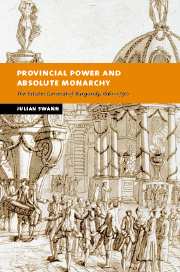Book contents
- Frontmatter
- Contents
- List of illustrations
- List of figures
- List of appendices
- List of map
- Preface
- List of abbreviations
- Map: The duchy of Burgundy in the eighteenth century
- 1 Historians, absolute monarchy and the provincial estates
- 2 Ancien régime Burgundy
- 3 The Estates General of Burgundy
- 4 Nosseigneurs les élus and the officers of the Estates
- 5 The provincial administration: authority and enforcement
- 6 ‘It's raining taxes’. Paying for the Sun King, 1661–1715
- 7 Provincial administration in an age of iron, 1661–1715
- 8 The limits of absolutism: crown, governor and the Estates in the eighteenth century
- 9 Provincial rivalries: the Estates and the Parlement of Dijon in the eighteenth century
- 10 Tax, borrow and lend: crown, Estates and finance, 1715–1789
- 11 An enlightened administration?
- 12 The coming of the French revolution in Burgundy, 1787–1789
- Conclusion
- Appendices
- Bibliography
- Index
12 - The coming of the French revolution in Burgundy, 1787–1789
Published online by Cambridge University Press: 05 July 2009
- Frontmatter
- Contents
- List of illustrations
- List of figures
- List of appendices
- List of map
- Preface
- List of abbreviations
- Map: The duchy of Burgundy in the eighteenth century
- 1 Historians, absolute monarchy and the provincial estates
- 2 Ancien régime Burgundy
- 3 The Estates General of Burgundy
- 4 Nosseigneurs les élus and the officers of the Estates
- 5 The provincial administration: authority and enforcement
- 6 ‘It's raining taxes’. Paying for the Sun King, 1661–1715
- 7 Provincial administration in an age of iron, 1661–1715
- 8 The limits of absolutism: crown, governor and the Estates in the eighteenth century
- 9 Provincial rivalries: the Estates and the Parlement of Dijon in the eighteenth century
- 10 Tax, borrow and lend: crown, Estates and finance, 1715–1789
- 11 An enlightened administration?
- 12 The coming of the French revolution in Burgundy, 1787–1789
- Conclusion
- Appendices
- Bibliography
- Index
Summary
Louis XVI's decision to call an Assembly of Notables in February 1787 marked the beginning of a protracted political crisis that would lead to the summoning of the Estates General in May 1789 and a few weeks later to revolution. During the course of what has become known as the ‘pre-revolution’, government censorship collapsed and the kingdom was exposed to an unprecedented degree of political debate. The most contentious issue concerned the composition of the forthcoming Estates General, with a ferocious quarrel about whether it should meet in the same form as at its last assembly of 1614. On that occasion, voting had been by order, and it was easy to imagine that, if repeated, the clergy and nobility would vote together to protect their privileged interests, prevailing by a majority of two to one. The fear of such an outcome led the third estate to embrace an alternative formula, of doubled representation for themselves and voting by head, devised in the autumn of 1788 during an assembly of deputies to the revived provincial Estates of Dauphiné. For an increasingly assertive third estate, the justice of its demands seemed incontrovertible, and it was incensed by the opposition of the nobility. In Burgundy, the issue had an additional resonance because of the obvious parallel with their provincial Estates. The question of how to reform them became a matter of great urgency, and for a few days in December 1788, it seemed possible that a common programme would be adopted.
- Type
- Chapter
- Information
- Provincial Power and Absolute MonarchyThe Estates General of Burgundy, 1661–1790, pp. 365 - 399Publisher: Cambridge University PressPrint publication year: 2003



